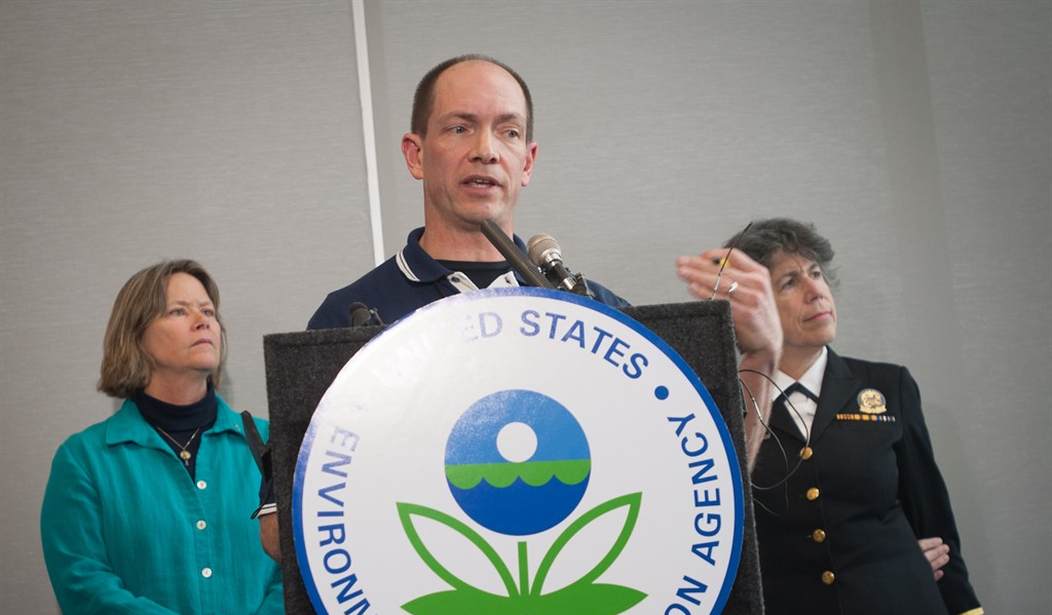Lost in the spectacle of elected Democrats lounging on the floor, yelling and picketing to disrupt the functioning of the duly-elected House of Representatives last week was the pending matter before the body: a vote on overriding President Obama's veto of a resolution to overturn the Department of Labor's so-called fiduciary rule, a sprawling bureaucratic maze of new requirements for investment advisers expected to cost the U.S. economy more than $30 billion.
When the House finally voted -- over the yelling of the undemocratic Democrats protesting the elected majority setting the agenda -- there was a failure of democracy of a different and more ominous sort: the veto was sustained and an expensive regulation was set to go into effect despite being opposed by a strong, but not veto-proof, bipartisan majority in the House and Senate.
It was the eighth Obama veto since Republicans took control of the Senate in the landslide 2014 election.Three were bills approving the Keystone XL pipeline, repealing Obamacare and increasing defense spending. The other five have all been actions under the Congressional Review Act to overturn specific outrageous regulations that the president imposed despite widespread public opposition: the NLRB ambush elections rule, the EPA greenhouse gas rule effectively prohibiting new coal-fired power plants, the EPA's so-called Clean Power Plan imposing a carbon cap regime on states, the Army Corps/EPA so-called Waters of the United States rule subjecting nearly every drop of moisture in the country to federal jurisdiction, and now the so-called fiduciary rule.
These five massive policy changes with multi-billion dollar impacts on the economy were not approved through the "how a bill becomes a law" process we learned about in school. To the contrary, none of them had enough support to pass even one house of Congress, but were imposed by an administration stretching the interpretive limits of laws passed decades ago and daring Congress to stop them.In each case, majorities in both the House and Senate did in fact vote to stop them, but President Obama used his veto pen to backstop his regulations, effectively governing with tiny one-third minorities in the House and Senate.
The solution is as simple as the problem is obvious: major regulations should be submitted for affirmative approval of Congress. A bill that would do just that, the Regulations from the Executive In Need of Scrutiny (REINS) Act has, passed the House in each of the last three Congresses but has yet to receive a Senate vote.It presently sits in Senator Ron Johnson's Homeland Security and Governmental Affairs Committee, awaiting action that Johnson -- a longtime critic of excessive federal regulation -- would do well to schedule expeditiously.
The bill, which is sponsored by Sen. Rand Paul in the Senate and aspiring senator Todd Young in the House, came not from any of the usual think tank suspects or Washington experts; it came from a constituent, Lloyd Rogers, who several years ago brought his water bill to a town hall meeting to confront then-Congressman Geoff Davis about how the EPA could double his water bill without a vote of Congress.Armed with a Constitution opened to Article I Section 1 -- "All legislative Powers herein granted shall be vested in a Congress of the United States, which shall consist of a Senate and House of Representatives" -- Rogers made a compelling case.
Of course Congress is more than capable of approving bad regulations, or blocking good ones. But if the decisions are made by elected officials, they can be held accountable by the people, unlike the nameless faceless bureaucrats presently wielding most of the economic policy power. That's the way our system is supposed to work.
Broken Regulatory Process Turns Democracy Upside-Down
The opinions expressed by columnists are their own and do not necessarily represent the views of Townhall.com.

Advertisement
Recommended
Trending on Townhall Videos
Advertisement
Advertisement
Advertisement
























Join the conversation as a VIP Member